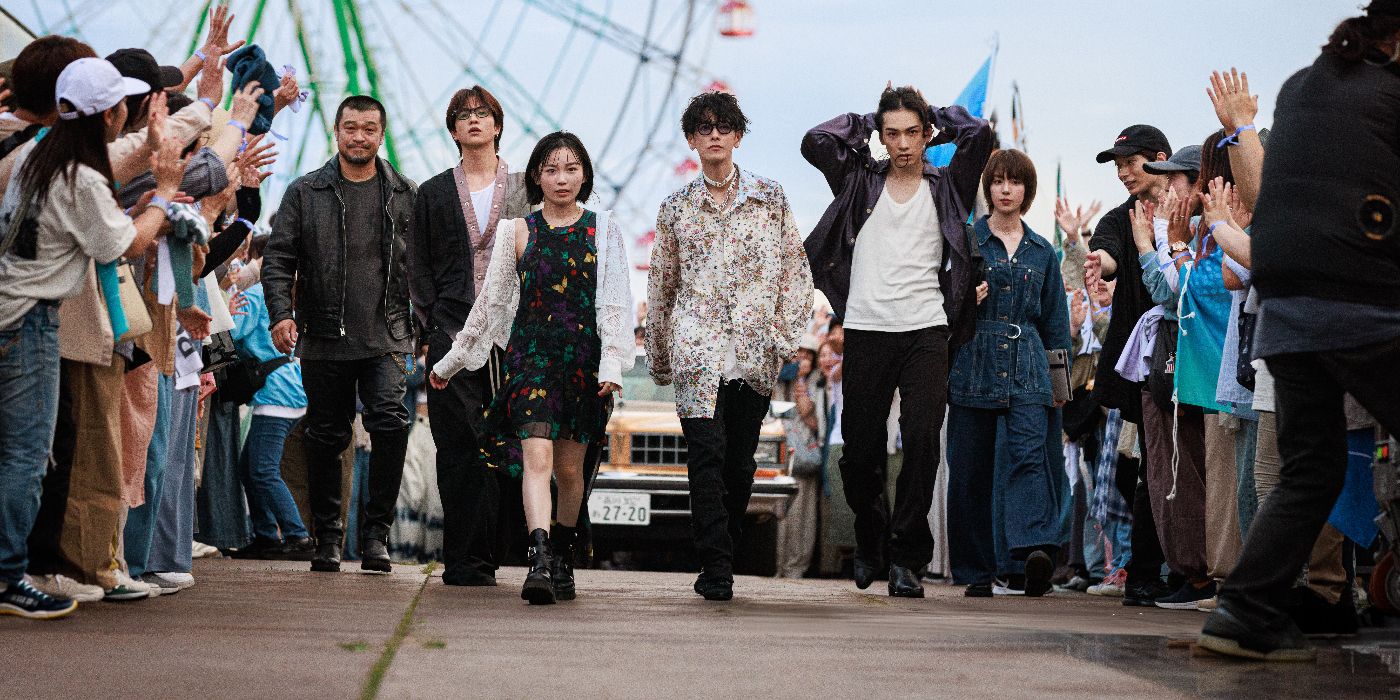‘Glass Heart’ Review: Netflix’s Spectacular New Drama Series Is Both an Thrill Ride
Even though the Korean entertainment industry didn’t need Netflix’s help to remain a lucrative business, the streamer’s access to Korean content as a distributor and a producer helped catapult K-Dramas into worldwide household awareness. Bit by bit, Netflix’s international library — including, but not limited to, C-Dramas, Indian dramas, and Scandinavian crime series — continues to grow in response to audience demand. Viewers have more series to choose from than hours in the day, and they consistently crave television set beyond geographical borders. When it comes to cultural exports outside Netflix’s thriving markets, however, their series (of which there are plenty) aren’t readily available on platforms as accessible as Netflix. It’s past time for other countries to receive the same spotlight as their neighbors.
Glass Heart, Japan’s new live-action drama, might be the answer where J-Dramas are concerned. A Netflix original adapting Wakagi Mio’s novel of the same name, the self-contained series following a rock band on the rise — especially their drummer, a woman bursting with heartfelt ambition — mixes the earnest sweetness of a coming-of-age journey with a soulful look at the creative lifestyle’s costs and rewards, a slow-burn romance, and a remarkably proficient production featuring thousands of extras and electrifying live performances. Glass Heart unashamedly champions music as a form of universal entertainment powerful enough to heal entertainers and listeners alike. Cynicism might tempt us to disregard that idea as cloying, and the concept can certainly read as kitschy when mishandled. Glass Heart boasts the right tonal precision to ensure its themes resonate with enough sweeping thrills and emotional dimension to remind you of the best concert of your life.
What Is ‘Glass Heart’ About?
After an infuriating rejection right before a music festival, aspiring drummer Akane Saijo (Yu Miyazaki) channels her frustration, her aspirations, and her sheer love of music into an impromptu performance. As she drums barefoot in the pouring rain, she earns a few admirers — a nearby crowd of fellow fans, and the accomplished stranger who starts accompanying her on piano from the stage. The two match melodies like they were made for each other. Three years later, however, Akane’s dream of joining a rock band seems more implausible than ever. Despite relentlessly pursuing every available audition, each all-male group turns her down. After one final, definitive elimination, Akane accepts that the years she spent striving to conquer an uphill battle amount to nothing. She surrenders the unrealized songs in her heart to focus on her college studies and help her supportive single mom with her curry restaurant.
A seemingly innocuous curry order turns life-changing when the delivery brings Akane face-to-face with her real-life piano man: Naoki Fujitani (Takeru Satoh), known as “the Amadeus of the rock industry.” To Akane’s even greater shock, her arrival at Naoki’s studio was no accident. The reclusive composing prodigy heard Akane’s spontaneous drumming session, and it restored his lost inspiration. Naoki has searched for Akane ever since, chasing after her instinctual talent and the kind of sound only collaboration can achieve. At his invitation, Akane joins Tenblank, Naoki’s four-person rock band, alongside pianist Kazushi Sakamoto (Jun Shison) and guitarist Sho Takaoka (Keita Machida).
The unknown amateur quickly hones her craft under the guidance of three modern maestros. Tired of being underestimated and silenced, Akane compensates for her low confidence with an overabundance of ambition. She also happens to be joy incarnate, her self-discovery characterized by enthusiasm, curiosity, and staying true to a refrain only she can hear. As Akane balances her maturing musicianship with the need to appease Naoki’s perfectionism, she’s catapulted into a world defined by jam sessions, album recordings, live television debuts, music videos, arena concerts, and the bloom of young love.
Music Brings Lonely Characters Together in ‘Glass Heart’
Glass Heart is an appropriate title for a piece about artists and their sensitive souls. Glass, after all, is both reflective and see-through, and easily broken if dropped. Neither a fully optimistic celebration of creativity nor wallowing in misery about the emotional and physical toll the process can take, the series embraces everything that happens in the space in between both extremes: listening to the natural music of your surroundings, staying attuned to your partners, and the transformative importance of discovering and honoring your heart’s desire. Akane’s perseverance stems from her insatiable inner drive, which thrives when nurtured and festers when suppressed. Before and after she joins Tenblank’s line-up, she practices until her hands cramp, bleed, and develop callouses; her drumming is inextricable from her self-expression, and when she and her bandmates stumble their way into synchronicity, she finally feels free. As such, she’s ravenous to both improve and prove herself against those seeking to tear her down — not just spiteful competitors, but an industry that turns a profit by manipulating and disregarding women.
Related
This Slow-Burn Anime Blends What We Love Most From K-Dramas
‘The Apothecary Diaries’ is an intelligent and flirtatious anime that strikes at your heart and your last brain cell.
Meanwhile, Naoki habitually loses himself in his own world. He doesn’t know when or how to stop composing long enough to sleep or eat, especially since ideas spill out of him in a torrent. He lives up to his elusive persona sometimes, but Naoki is a refreshingly atypical take on the tormented genius – quiet, considerate, and supportive more than aloof and cutting. (In another nice change of pace, Glass Heart doesn’t milk the requisite “traumatic past” trope more than necessary.) Akane might be his muse, but the feeling’s mutual; thanks to a single perfect coincidence, the two share a sincere, warm, soulmate-esque bond that brings out the best in each other, even when they’re stuck in a potentially unrequited, definitely will-they-won’t-they situation.
Even when that tender angst reaches a crescendo, romance never distracts from Glass Heart‘s main theme of lonely people finding their places in the world — both on a large scale, like realizing their dreams, and through smaller, yet no less crucial ways, like finding the courage to take a risk that results in a found family. A functional group demands balance, sacrifice, and partnership, especially for musicians striving to craft one harmonious hook after another. Through Naoki’s unifying influence, Tenblank’s members — and their songs — reap the benefits of their symbiotic relationship. Kazushi, surly, reserved, and jealous in his glasses and sweater vests, reckons with feeling inadequate compared to the whims and wisdom of an adult wunderkind like Naoki. Like the best guitarists, and despite his reluctance to join a band, Sho’s level-headed personality centers the group. Even Naoki’s bitter rivalry with Toya Shinzaki (Masaki Suda), the bad boy singer of Tenblank’s main competitor, undergoes a dramatic shift — not because Naoki is an angel among men, but because, at its peak, articulating and experiencing art can change lives.
Appropriately, Glass Heart has its own rhythm. Like a sold-out movie theater crowd on opening night, the best concerts are communal experiences where strangers are unified through their shared love for an artist. Co-directors Kensaku Kakimoto and Kotaro Goto and cinematographer Kensaku Kakimoto capture that electrifying energy by adopting the language of concert films: rapid cuts, dramatic zooms, sweeping drone shots, and slow motion. The latter emphasizes the exhausting dedication, the meticulous precision, and the sheer muscular endurance this profession requires. Tenblank’s simulated live performances are even more impressive considering the efforts of Glass Heart‘s cast and crew to sell the illusion. According to Netflix, “tens of thousands of extras” comprised the fictional concert crowds, while “the actors dedicat[ed] over a year to learning instruments, singing, and even making their actual debut as a band.” The training and technical logistics alone deserve acclaim, while the results speak for themselves; no disconnect occurs when the actors pivot into musicians, because suspension of disbelief isn’t required.
Otherwise, Glass Heart‘s artistic framing, pacing, and spatially aware lighting evoke either a dreamy, soothing atmosphere or an invigoratingly intense thrill ride. For every bead of sweat shed during a punishing performance in a spotlit stadium, there’s the cozy romanticism of late winter: oversized scarves, raindrops striking the street, faded autumn foliage. The series doesn’t overuse the song cues and emotionally charged, slow-motion runs that K-Drama fans will immediately recognize, but a show about imagination, deep feelings, and starstruck love, with some mildly illogical yet satisfying payoffs sprinkled throughout, suits that heightened style. The all-woman writing team of Mari Okada, Tomoko Akutsu, Shiho Kosaka, and Anna Kawahara occasionally falls prey to conveying feelings through expository dialogue. For the most part, however, Glass Heart‘s nuanced expressions and meaningful silences speak for themselves without spoon-feeding the audience.
After an engaging and promising start, Glass Heart‘s back half (all 10 episodes were provided for review) does embrace more obvious clichés. Certain narrative choices challenge Tenblank’s bond, but the weight of those plot shifts somewhat muddles the series’ initial thematic hook. Similarly, Akane personifies the archetype of the chipper and pure-hearted young woman, yet newcomer Yu Miyazaki’s exemplary performance renders the character impossible to fault — sincere, effervescent, and entirely human. The romantic developments can be seen from a mile away, too, although that isn’t necessarily a bad thing (if you like tsundere dynamics, you’re in luck). None of these missteps detract from a winsome, ambitious, and engaging series. Between its triumphant sincerity, spectacular visuals, and compulsive energy, Glass Heart is altogether watchable and oddly comforting to boot — like unexpectedly hearing your favorite song on the radio.
Glass Heart premieres July 31 on Netflix.

Glass Heart
Packed with live performances, romance, and the power of music to heal, Netflix’s Glass Heart is a must-watch.
- Release Date
-
July 31, 2025
- Network
-
Netflix
-

Takeru Satoh
Naoki Fujitani
-

- The themes are heartfelt and engaging.
- The cinematography in the slower scenes creates an immersive atmosphere, while the concert scenes are a remarkable technical achievement.
- The cast delivers soulful performances, and their commitment to learning the instruments shines through.
- The back half of the season indulges in a few too many cliches.




